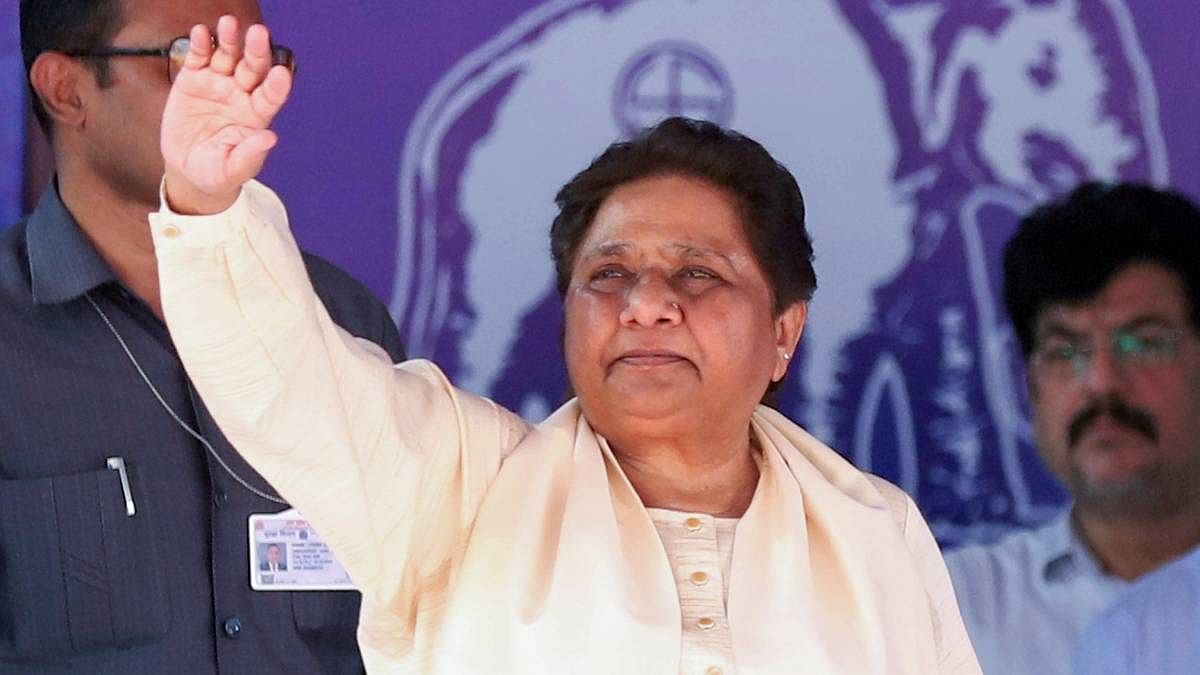New Delhi: Throughout the long-drawn Lok Sabha election, a question that rattled all political observers was what Bahujan Samaj Party (BSP) supremo Mayawati’s game plan really is — is it to benefit the Bharatiya Janata Party (BJP), eat into both the BJP and the Samajwadi Party’s (SP) votes or actually fight for its own survival?
With the party having failed to even open its account — as opposed to the previous Lok Sabha elections when the BSP secured 10 seats in Uttar Pradesh in alliance with the SP — the question rings out louder than before. Is the BSP going to survive?
According to trends from the Election Commission as votes were counted for the Lok Sabha polls Tuesday, the BSP’s vote share has slipped to a single digit figure — 9 percent — in Uttar Pradesh. It has failed to win even in any of the 17 SC reserved constituencies in the state. Of these, the SP is leading on 8 and the Congress on 1. The BJP’s tally in SC-reserved seats too has declined significantly from 15 in 2019 to 7 in this election.
The 2024 election results, however, are only the most recent manifestation of the party’s rapid decline that has been underway since 2012 when the BSP was voted out of power in the Uttar Pradesh assembly polls.
In the 2019 election, the party managed to secure 19 percent of the vote share and win 10 seats in the Lok Sabha as it piggybacked on the SP’s support base. However, since 2012, its vote share has shrunk considerably with each passing election.
In the 2007 assembly election in UP, the BSP was voted to power with a single majority for the first time, winning 206 of the 403 assembly seats, and securing a vote share of around 31 percent.
In the 2012 assembly elections, its tally dropped to 80 seats, while its vote share dipped to 26 percent. In 2017, the party managed to secure only 19 seats, even as its vote share dipped only marginally to 22.23 percent.
In the 2022 assembly elections came the BSP’s worst-ever performance till then, as it managed to win only one seat, and its vote share dipped to around 13 percent.
In the 2009 Lok Sabha elections, Mayawati, riding high on her 2007 UP state election victory, was aiming for the high office. Her party won 20 Lok Sabha seats, and managed to secure a vote share of 27 percent in the state. But by 2014, the party’s tally fell to 0, even as it secured a vote share of 20 percent. In 2019, while it won 10 seats as it fought the election in alliance with the SP, political observers argue the one-off upswing in the BSP’s vote share was misleading.
“The BSP has been in a state of perpetual decline since 2012,” argues political analyst and fellow at the Centre for Policy Research (CPR), Rahul Verma. “There is no future for the party. Its vote share has declined with every passing election, and any sort of revival seems difficult… It used to be a party with 25-27 percent vote share, but in the last assembly elections, this fell to 12 percent with the party losing a large number of seats where it secured only 10 percent votes.”
Also Read: Why the ‘third’ front in Uttar Pradesh may not be a big threat to either BJP or INDIA candidates
Why BSP has ‘declined’
According to Verma, there are at least three reasons for this state of perennial decline the BSP finds itself in. One, it failed to create a second-rung leadership. Two, it made little investment in building its organisational strength. Three, it also made little ideological investment in the party. And finally, it failed to cater to the rising Dalit middle class, which had not just material aspiration, but also cultural aspiration, which the BJP managed to tap into.
Since 2014, the Dalit vote, especially of the non-Jatavs, has shifted significantly to the BJP, which along with the RSS has managed to bring the Dalits into the Hindu-fold through careful social and cultural outreach.
Moreover, the BSP faces an existential threat, which every caste or identity-based party faces in a single-party system. “This is a BJP-dominated system,” Verma says. “The years of fragmented or coalition politics from 1989 to 2014 allowed different caste-based parties to thrive. That period is over.”
Political analyst and author Badri Narayan further argues that the time of independent Dalit politics might itself be over. “This is a time of neoliberalism, and Dalit aspiration has exploded,” he says. “The BSP has not been able to capture that.”
While even as its core Jatav vote-bank, which is estimated to make up around 12 percent of the total population of UP, had kept the party afloat so far, it now seems that the Jatavs too are drifting away from the BSP.
“With the BJP now back in power (in UP), it is likely that the BSP completely vanishes from the scene and dies in the next five years,” says Ravi Kant, a professor at Lucknow University.
“The pressures on her (Mayawati) that have kept her quiet and reticent all these years are bound to increase with five more years of the BJP government. The party won’t be able to survive that,” he adds. “Moreover, those who have voted for her will also now blame her for aiding the BJP by keeping quiet… they will also desert her.”
The only way the party can survive now is if Mayawati hands it over to (nephew) Akash Anand, and takes a political sanyas herself, he said.
(Edited by Nida Fatima Siddiqui)
Also Read: NDA & INDIA make hay as MPs leave BSP in hordes — defectors get poll tickets, campaign duties

